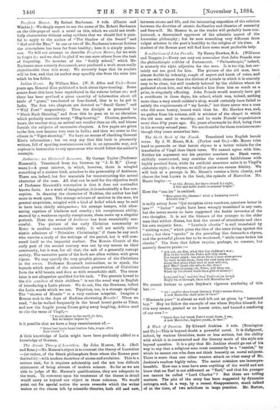The Sixth Book of the .Eneid. Translated into English heroic
verse. By J. W. Moore, M.A. (Parker and Co.)—Mr. Moore tries hard to persuade us that heroic rhyme is a better vehicle for the translation of Virgil than blank verse. We cannot agree with him. Neither his argument nor his practice convince us. Blank verse,. skilfully constructed, may combine the utmost faithfulness with highly poetical form, while its artificial structure suits it to Virgil's elaborate style ; in rhyme, no skill or pains can ensure fidelity. We will look at a passage in Mr. Moore's version a little closely, and choose the best known in the book, the episode of Marcellas. Mr. Moore begins :-
" At this 2Eneas, for there struck h's sight. A fair and noble youth in armour bright."
Here the "una ire" is omitted.
" How great the likeness I what a humming crowd Attends him !"
is sadly astray from "Qui strepitus circa comitum, quantum instar in ipso !" " Instar " might have been wrongly translated in any case, but the metre seems to have suggested the feeble inversion of the two thoughts. It is not the likeness of the younger to the older man that strikes Aneas, but first the crowd of attendants and then his own majestic form. " Lacrimis obortis " is well translated by " sobbing voice," which gives the idea of the tears rising against the voice ; but then "speaks" in the preceding line demands a rhyme, and the powerful phrase has to be weakened, "while tears bedew his cheeks." The lines that follow require, perhaps, no censure, but scarcely deserve praise :—
" Ask not, my Son, what this thy children's woe ; Him to the world the Fates will only show, Nor longer grant: too great Rome's race were grown Ye Gods would deem, were the vast boon her own. Along that plain what wail of men will rise, And Mars' great city echo to the skies
What funei al pomp, oh, Tiber, wilt thou fee, When by his recent tomb thou glidest silently !
' • " • • •• ' •
Lamented boy I oou'dst thou Fate's stern decree Haply burst through, thou wilt Marcellus be."
We cannot forbear to quote Dryden's vigorous rendering of this last :—
" Ab! couldst thou break through Fate's severe decree, A new Marcellas shall arise in thee!"
" Miserande pner " is almost as well left out as given by "lamented boy." May we follow the example of one whom Dryden himself, for this very reason, praised as an honest critic, and hazard a rendering of our own ?-
" Canst thou but break Fate's cruel doom, I see, A new Marcella., hapless youth, in thee I"














































 Previous page
Previous page